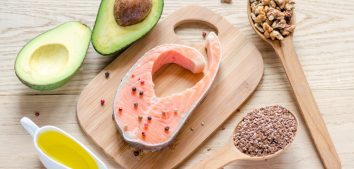
Food allergies and nutrition of pregnant women
Food allergies and nutrition of pregnant women
As I mentioned in my book “Healthy Mum – Healthy Mother’s Guide”, preparing for pregnancy is a good way to check if we have a problem with allergies or any food intolerances. If you have been diagnosed with undesirable reactions to food, you must not only follow a healthy diet, but first of all, exclude products causing allergy. If you are not hypersensitive, there is no need for a hypoallergenic diet (excluding most allergenic products) during pregnancy.
Food allergy is considered a serious health problem in modern society. The incidence of this disease varies and depends on the population, its age, food habits, ethnic differences and the degree of economic development of the country. Kaczmarczyk and co. reported that food allergies are most common among youngest children (approximately 6-8% in infancy). The incidence is lower among young people (about 3-4%) and adults (about 1-3%). Allergy sufferers are often affected by genetic predisposition to their development. In other words, kids with parents suffering from allergies have a higher risk of allergic diseases. If both the mother and father of the child suffer from any allergic problems, the probability that the child will inherit it is high.
Allergies, however, can also develop in a child whose family has never had problems before. It should be emphasized that in today’s environment there are a number of factors that increase the risk of developing allergic diseases. This includes, first of all, growing environmental pollution and progressive hygiene, ie sterilization of our environment. This is because of the abuse of antibiotics or disinfectants. As a consequence, our immune system, a large part of which is located in the digestive tract, is not properly “stimulated” by its natural enemies (bacteria, fungi, parasites). In addition, the widespread use of antibiotics (including antibiotics added to meat) destroys the biological balance of our intestines, resulting in the proliferation of pathological strains of bacteria. Our resistance system often starts to “confuse” and combat harmless elements such as food or pollen.
As I mentioned above, if you are allergic, the risk of passing this disease to your baby is higher. It worth to breasfeed your baby, at least for the first 6 months of his life. The opinion of the Polish expert group on food allergies is clear: “First of all, infants should be breastfed for the first 4-6 months of life, and solid products (milk-free products, including gluten) should be introduced no sooner than at 4 months. , but not later than at 6 months of life “(Kaczmarczyk and co.). The study has shown that this method of feeding can reduce the risk of allergies in children. Factors that reduce the likelihood of developing an allergic disease include probiotics that helps to keep normal microbes in our intestines and balance the immune system. If you have a problem with allergies you should ask your doctor about the usage of probiotics.
When should you consult your doctor?
If your baby shows signs of allergy and you are breastfeeding, it is likely to be possible to apply the elimination diet, ex. exclude “problematic” foods. If a child is allergic, his or her body starts producing specific antibodies (eg, against cow’s milk proteins). We are talking about the so-called. immediate allergy. The most common symptoms are gastrointestinal (vomiting, loose stools with blood, mucus, chronic constipation, colic), skin reactions on cheeks, torso, limbs, pelvic and erythematous reactions. Often it is a skin-forming form of food allergy like dermatitis. Children are often reluctant to take food, become restless, tearful and irritable. Food allergens are specific glycoproteins of animal or plant origin, most commonly found in: cow’s milk, chicken eggs, soybeans, cereals, meat, fish, nuts, fruits, vegetables and seafood. Food allergy may also manifest as respiratory problems (cough, sneeze, recurrent upper respiratory tract infections). Breastfeeding is one way to prevent food allergies.
The most common product causing allergies in children is cow’s milk protein. If this type of reaction is found, you should eliminate milk and dairy products from your diet. Milk suppression should be maintained when introducing solid foods in infants. It is important for your child to have a balanced diet to grow properly, gain weight and grow at the right pace. Parents should not decide to eliminate any products from the child’s diet alone. In this situation, medical consultation is always necessary.
Breastfeeding is the best option for a small organism. Unfortunately, you can not always breastfeed, or at some point you have to introduce modified milk. If your toddler is fed with modified milk, it is important to make a decision about his or her feeding with your doctor. If your child is allergic to milk protein, not every milk-mixture will be suitable for him or her, and the wrong product may result in the development of allergy symptoms. Hypoallergenic milk will need to be introduced. After eliminating milk from baby diet, the improvement is usually seen after a few days. If the allergy was diagnosed in neonatal or infancy stage and a restrictive diet is used, the chance of returning to full diet after a few years is quite high. It is estimated that about 80% of children diagnosed with food allergu illness during infancy ”grow out” from the disease before the age of 4-5 (Kaczmarczyk and co.).
The first symptoms of allergies can occur not only in the newborn or infant but also in an older child, in school age or in kindergarten. Its symptoms are generally less violent and intensified in the course. It does not change the fact that here also it will be necessary to introduce the elimination of certain products from the diet.
I take great care when it comes to this subject. As a child suffering from asthma and having many allergies, I know how important it is to prepare for pregnancy and pay attention to all the above details.
Let’s not neglect this subject Dear Mums!
Source: Maciej Kaczmarski et al. Polish statement on food allergy in children and adolescents. Post Dermatol Alergol 2011; XXVIII, 5: 331–367.











Comments No Comments
Join the discussion…